- Register
- Log in to Tune-In
- Wishlist (0)
-
Shopping cart
(0)
You have no items in your shopping cart.
Beatles News

In August 1962, Ringo made the daring and hugely prescient decision to leave Rory Storm and the Hurricanes to join a new up-and-coming Liverpool band. He officially played with The Beatles for the first time at the Royal Horticultural Society's Annual Dance at Hulme Hall, Port Sunlight. Already friends with the boys from performing at the same gigs in Hamburg and the UK, according to Mike McCartney in his book, Mike McCartney's Early Liverpool, he was the perfect fit.
'Ringo's style of playing complemented John, Paul and George's music... He had a dry sense of humour and was able to fit in easily with the band.' - Mike McCartney
Mike captures Ringo in his photography and through illuminating anecdotes in his limited edition book, Mike McCartney's Early Liverpool and the limited edition print, Cavern Club Rehearsal.
Source: genesis-publications.com
details
When it comes to shaking up the guitar world, in many ways Led Zeppelin were to the ‘70s what the Beatles were to the ‘60s.
Around a fortnight after Led Zeppelin released their eponymous debut album (opens in new tab) in January 1969, the Beatles performed together for the final time on the rooftop of their Apple Corps headquarters in London.
And as the decade that gave us Flower Power crossfaded into the era of hard rock, the airwaves grew heavier with the sound of electric guitar riffs.
Leading the way for myriad bands the world over, Zeppelin’s far-reaching appeal has inspired generations.
Source: Rod Brakes/guitarplayer.com
details
Sir Paul McCartney’s picture book, Grandude’s Green Submarine, has inspired a special episode of online children’s yoga series Cosmic Kids Yoga.
The book, which was originally published last year, is the sequel to the music icon’s first picture book Hey Grandude! and follows Grandude and his grandchildren – known as the chillers – as they go on an underwater adventure to find their music-loving grandmother Nandude.
In a special episode of Cosmic Kids Yoga – a YouTube series written and presented by Jaime Amor – the adventures of Grandude and the chillers are blended with yoga to provide children across the world the opportunity to experience yoga and mindfulness through the power of storytelling.
Grandude and the chillers are guided to Nandude by her music, written by Sir Paul and featured in the special episode.
Source: PA News Agency/bridportnews.co.uk
details
In 1971, legendary sitarist, Ravi Shankar, asked his long-time friend, George Harrison, to help with a humanitarian crisis happening in his native Bangladesh; the result was the Concert for Bangladesh. The former Beatle organized the benefit concert quickly.
George wanted to help Shankar and the Bangladeshi people. Every part of the Concert for Bangladesh had to be perfect, even its date.
In late 1971, Shankar told George about the humanitarian crisis in East Pakistan (formerly East Bengal).
A devastating cyclone had killed 500,000 people. After months of inaction from the West Pakistani government, people wanted a change, and Eastern nationals declared themselves the independent country of Bangladesh. It started a bloody war. The Western Pakistani troops committed genocidal acts on the Bangladeshi people.
Source: cheatsheet.com
details
Though a majority of The Beatles’ songs were written by John Lennon and Paul McCartney, George Harrison accumulated hundreds of songs he had written for the band that never made the cut. Still, the guitarist managed to squeeze one or two songs onto Beatles albums, beginning with his first credited song with the band, “Don’t Bother Me,” off their second album, With the Beatles, and later on with Help! tracks “I Need You” and “You Like Me Too Much.”
As he was introducing more diverse instrumentation—sitar, tambura, 12-string, and slide guitars—into the band’s arrangements, Harrison continued to pilfer more space on the track list on subsequent releases with “Think for Yourself” and “If I Needed Someone” for the group’s sixth album Rubber Soul and the more tender ballad “While My Guitar Gently Weeps,” which featured his friend Eric Clapton on the recorded version, along with four contributions off The White Album and his most famous Abbey Road offerings “Something” and “Here Comes the Sun.”
Source: americansongwriter.com

'I don't know if I'm comfortable with that': John Lennon's son Julian is shocked by his father being brought 'back to life' to duet in hi-tech stage performances with ex-Beatles bandmate Sir Paul McCartney
Julian was just 17 when his father John was gunned down in December of 1980.In June he watched father's posthumous duet with former bandmate McCartney.
Sir Paul collaborated with filmmaker Peter Jackson to bring Lennon 'back to life'. Custom AI simulated John Lennon's voice, allowing Sir Paul to duet at Glasto. The stunt proved a hit among Beatles fans, and Julian admitted he 'actually enjoyed it'.
Source: Richard Eden, David Averre/dailymail.co.uk
details

In 1991, George Harrison, his long-time friend, Eric Clapton, and Clapton’s band embarked on a 12-show tour of Japan. Although, it took some convincing on Clapton’s part to get George to do it. George never liked touring, especially when he was a Beatle and even more after his disastrous 1974 solo tour of America.
The “Taxman” singer reluctantly agreed to the Japanese tour only because he needed to get out of a rut. Plus, touring with Clapton’s band was easier than finding and forming a band. When it finished, George was thankful to Clapton for giving him the push he needed to get back on the road.
Source: cheatsheet.com
details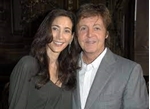
Paul McCartney has been the object of many romantic desires since his teen idol days as frontman of The Beatles, but his personal life has had its highs and lows.
After his first wife, Linda, died of breast cancer in 1998, McCartney said he "cried for a year." His subsequent marriage to former model Heather Mills ended in an acrimonious divorce and a $50 million settlement.
But McCartney didn't let the breakup sour him on finding love, and he was soon spotted with Nancy Shevell, a New York-based businesswoman and breast cancer survivor who founded a cancer resource center in the Hamptons.
Source: people.com
details
Apart from working with the Beatles, John Lennon also collaborated with the love of his life, Yoko Ono. In 1980, he and Ono released their collaborative effort ‘Double Fantasy.’ Three weeks after its release, Lennon was shot and killed by a Beatles fan named Mark David Chapman.
On December 8, 1980, John Lennon also gave his last interview before his tragic passing. Speaking to RKO Radio Network’s DJ Dave Sholin and Laurie Kaye, Lennon revealed his opinion on Bruce Springsteen and praised one of The Boss’ songs.
Source: Elif Ozden/rockcelebrities.net
details
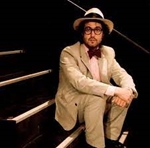
John Lennon‘s son, Sean Ono Lennon, inspired two similarly-named songs from the former Beatle’s final album, Double Fantasy. Yoko Ono wrote one of the songs. Subsequently, she revealed she was making a statement about men in general with the track’s lyrics.
“Well, what can I say?” John replied. “It’s about Sean. It’s self-explanatory. The music and the lyric came at the same time.”
Yoko wrote a similarly titled song, “Beautiful Boys,” for Double Fantasy. She discussed the track too. “That speaks for itself, really,” she said. “It’s a message to men. John and Sean inspired me, but the third verse is about all the beautiful boys of the world. That’s sort of like the extension of the idea. I had relationships with men, but it was always ‘You know where the door is.'”
Source: cheatsheet.com
details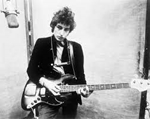
Bob Dylan had something witty to say after listening to The Beatles‘ 1967 album, Sgt. Pepper’s Lonely Hearts Club. Dylan met the band in 1964. Shortly after, the two began to inspire each other.
Greene wrote The Beatles were “so mesmerized by his wise lyrics and simple chords that they played the albums constantly in their Hôtel George V suite.”
Then, Dylan found the band and was similarly impressed. “Dylan drove cross-country from Denver to New York in 1963 with friend and photographer Barry Feinstein, playing the radio nonstop, and by midjourney it was clear to Dylan that the Beatles were ‘doing things nobody was doing. Their chords were outrageous and their harmonies made it all valid, but I kept it to myself that I really dug them,’ he told biographer Anthony Scaduto.
“‘Everybody else thought they were for the teenyboppers, that they were going to pass right away, but it was obvious to me that they had staying power.'”
Source: cheatsheet.com
details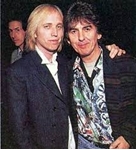
When Tom Petty started working on his debut solo album, Full Moon Fever, he turned to George Harrison for help. The two musicians were friends and had worked together in The Traveling Wilburys. Harrison was a fan of the album and helped champion it. He also helped Petty improve some of the songs. Petty explained that there was one line in “I Won’t Back Down” that confused Harrison. His feedback helped bring the song to its finished form.“I think I needed a friend really badly,” he said in the book Petty: The Biography by Warren Zanes. “My friendship with the band was a different kind of friendship. And it was frayed. I’d become very lonely. George came along, and we got so close; it was like we had known each other in some other life or something. We were pals within minutes of meeting each other.”
Source: cheatsheet.com
details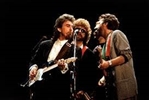
George Harrison said Jeff Lynne’s singing voice made him want to try harder on his vocals for his 1987 album, Cloud Nine. However, Lynne might have formed his singing voice on George’s.
For the most part, George’s singing voice was always in top form. Except during his first solo American tour in 1974.
Before his Dark Horse Tour, George did a lot of recording. It exhausted him and wore out his voice.
“That was the problem in 1974, when I toured America,” George explained to Rolling Stone in 1979. “I’d done three albums before I went on the road, and I was still trying to finish my own album as we were rehearsing, and also we’d done this other tour in Europe with these classical Indian musicians. By the time it came to going on the road I was already exhausted.
Source: cheatsheet.com
details
Over the weekend, the Hollywood Critics Association hosted its 2nd Annual HCA TV Awards at The Beverly Hilton in Los Angeles. Disney picked up a number of awards at the event, with “Dopesick” and “Abbott Elementary” picking up multiple awards. Also, What’s On Disney Plus’s writer Mama’s Geeky Tessa Smith presented one of the awards during the ceremony.
Disney+ Originals picked up a number of awards including “The Beatles: Get Back” winning in the Best Streaming Docuseries or Non-Fiction Series category. While “Chip ‘N Dale: Rescue Rangers” won the award for Best Streaming Movie.
Source: Roger Palmer/whatsondisneyplus.com
details
George Harrison made it his life’s work to raise consciousness, in every sense of the phrase. In 1971, he managed the extraordinary combination of both raising money for a desperate humanitarian plight in South Asia, and creating a hit record about it.
Probably not too many radio programmers or record buyers knew very much about the former East Pakistan until Harrison used his influence to publicise the country’s plight. He had been deeply moved when his friend Ravi Shankar brought to his attention the human disaster in which millions of refugees from the country were starving, because of the effects of the Bhola cyclone of 1970 and the Liberation War.
Source: Paul Sexton/yahoo.com
details